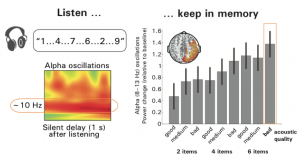Dear friends and colleagues, SfN Participants!
Please go and check out our posters in New Orleans this year.
It’s all happening in the Monday (15 October)
AM posters session, plus a bit of Tuesday
AM, and one talk on monday
AM as well. Thanks for your support!
TALK MONDAY AM, 10:30
321.11 — Selective attention to auditory temporal features separates domain-general from timing-specific functions
*M. J. HENRY, J. OBLESER;
(in the Nanosymposium 321. “Timing and Temporal Processing I”)
MONDAY AM POSTER SESSION
366.05/FF7 — Alpha-band activity reflects trade-off between temporal preparedness and cognitive load for speech in noise
*A. WILSCH, M. J. HENRY, B. MAESS, J. OBLESER
368.10/II3 — Cortical dynamics and subcortical morphology predict rapid adaptation to changing spectro-temporal cues
*M. SCHARINGER, M. J. HENRY, J. ERB, J. OBLESER
368.14/II7 — Perceptual adaptation to degraded speech: Tuning in cortical and subcortical brain structures
*J. ERB, M. J. HENRY1, F. EISNER, J. OBLESER
368.21/II14 — Slow frequency modulation entrains neural delta oscillations and determines human listening behavior
M. J. HENRY, *J. OBLESER
TUESDAY AM POSTER SESSION
595.14/CCC5 — Within-subject alpha power is negatively correlated with subjective intelligibility — A study of degraded word comprehension in MEG.
*C. MCGETTIGAN, S. KOTZ, B. MAESS, S. SCOTT, J. OBLESER
595.23/CCC14 — Functional lateralization of the inferior frontal gyrus during sentence processing: The influence of structural lateralization and handedness
*L. MEYER, J. OBLESER, A. D. FRIEDERICI

